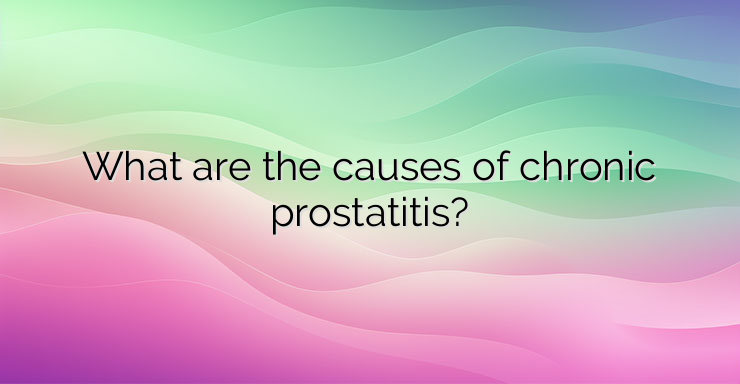What is chronic prostatitis? Chronic prostatitis is inflammation of the prostate that lasts 3 months or more. The condition is often painful and can affect sexual function and the ability to urinate. Many health problems, including recurrent bacterial infections and damage to the nerves or muscles in the pelvic area, can cause chronic prostatitis. What is the prostate gland? The prostate is a small gland that is part of the lower urinary tract in men. The prostate gland is located below the bladder and surrounds the urethra, the tube through which urine and semen pass. The prostate is part of the male reproductive system and produces secretions that make up the fluids that make up semen. The muscles of this gland also help push the seminal fluid into the urethra during ejaculation. Because of their location and function, prostate problems can affect urination as well as sexual activity in men. Prostatitis is an inflammation of the prostate that can often be painful and can be a chronic or acute condition: Chronic prostatitis develops gradually and lasts for months or even years. Doctors define prostatitis as chronic if symptoms last 3 months or more. The condition may not respond well to the initial treatments prescribed by a specialist; Acute prostatitis is a temporary condition that occurs suddenly and may last only a few days or weeks and often responds well to treatment Prostatitis is the leading cause of urinary tract problems in men under the age of 50 and the third most common urinary tract problem roads in men over 50 years of age. What are the causes of chronic prostatitis? Making an accurate diagnosis is the key to effective treatment of the condition. However, diagnosing the cause of chronic prostatitis can sometimes be challenging. The causes of chronic prostatitis fall into two broad categories: Chronic bacterial prostatitis Bacterial infection of the prostate gland causes chronic bacterial prostatitis. In some men, this infection develops after a urinary tract infection or treatment for acute bacterial prostatitis. Symptoms of chronic bacterial prostatitis are often milder than those of acute bacterial prostatitis. A patient who previously had an acute infection may notice that their symptoms improve but do not go away. Some men suffering from chronic bacterial prostatitis may find that the infection persists. This may be due to the fact that the bacteria are resistant to antibiotic treatment or the course of antibiotic treatment is too short. According to one study, some bacteria that infect the prostate can form biofilms. Biofilms are similar to the plaque that forms on teeth and can make the infection more difficult to treat.Chronic non-bacterial prostatitis or chronic pelvic pain syndrome Chronic non-bacterial prostatitis is a non-bacterial form of prostatitis that can have multiple causes and is more difficult to treat. Men who have had a previous bacterial infection of the prostate are at increased risk of developing this type of prostatitis. Other patients may develop chronic prostate pain after a bacterial infection has healed. Possible causes of chronic prostatitis include: Psychological stress Damage to the urinary tract from surgery or physical injury References: 1. Krieger, JN, Lee, SW, Jeon, J., Cheah, PY, Liong, ML, & Riley, DE (2008, February). Epidemiology of prostatitis. International Journal of Antimicrobial Agents 2. National Institute of Diabetes and Digestive and Kidney Diseases (NIDDK). Prostate Problems 3. National Institute of Diabetes and Digestive and Kidney Diseases (NIDDK). Prostatitis: Inflammation of the prostate 4. Sharp, VJ, Takacs, EB, & Powell, CR (2010, August 15). Prostatitis: Diagnosis and treatment. American Family Physician


Leave a Reply